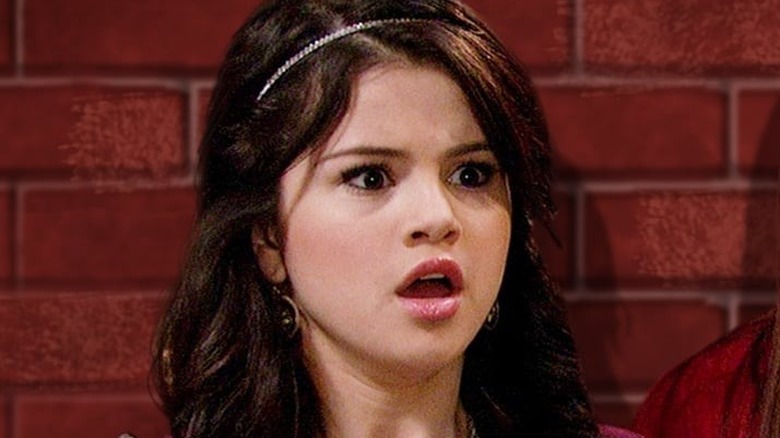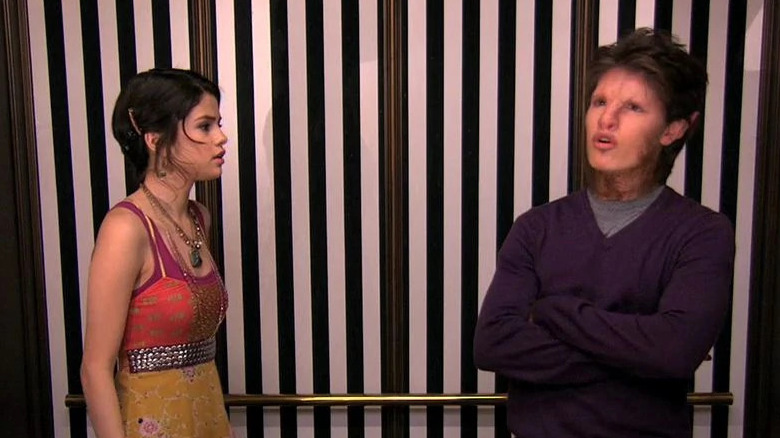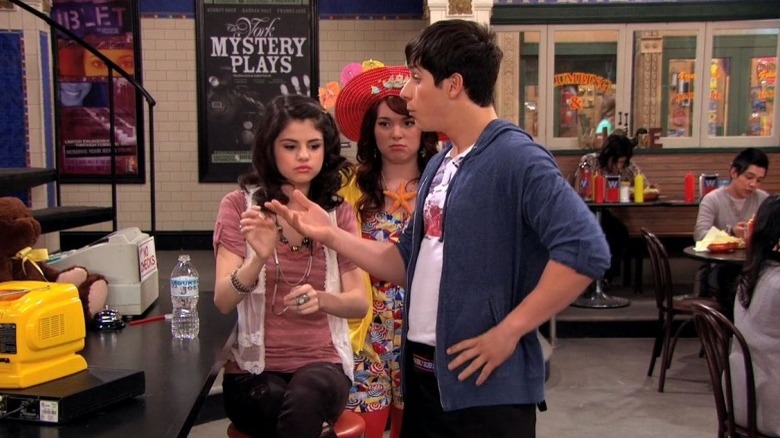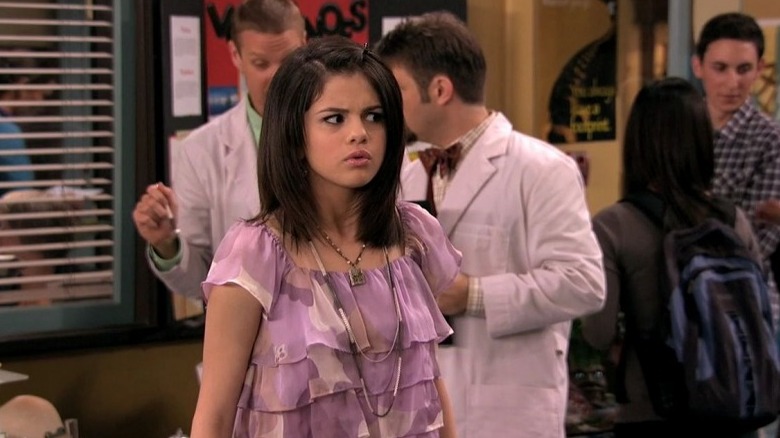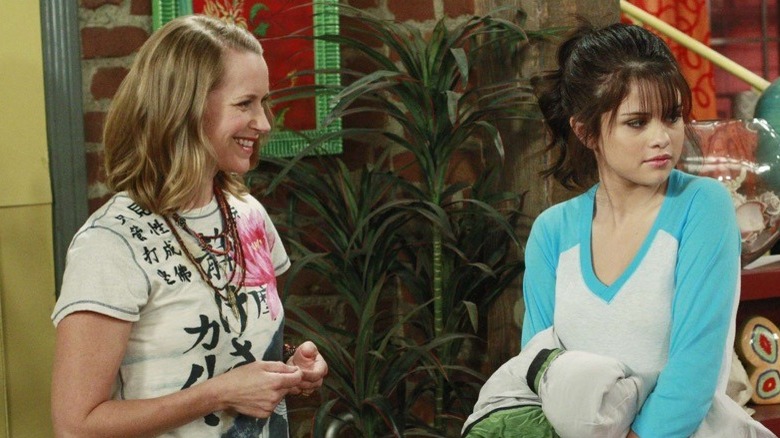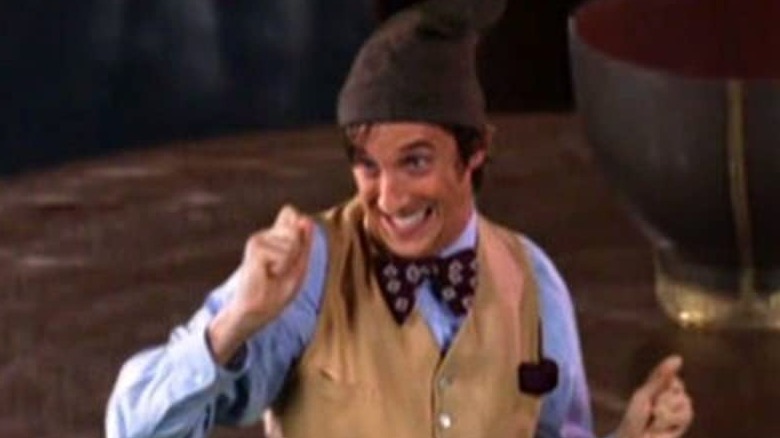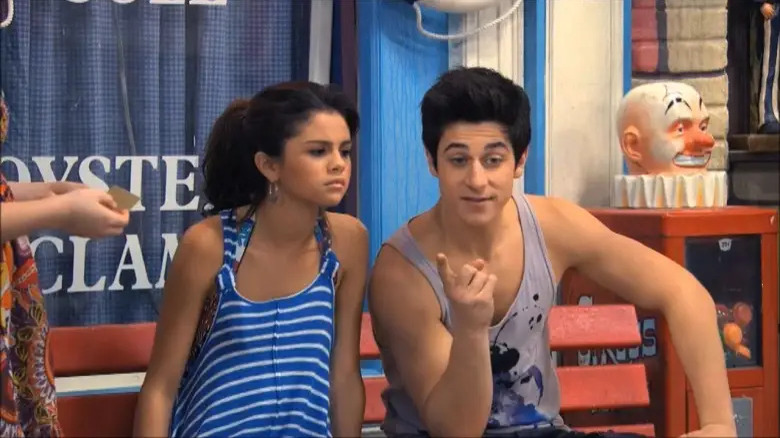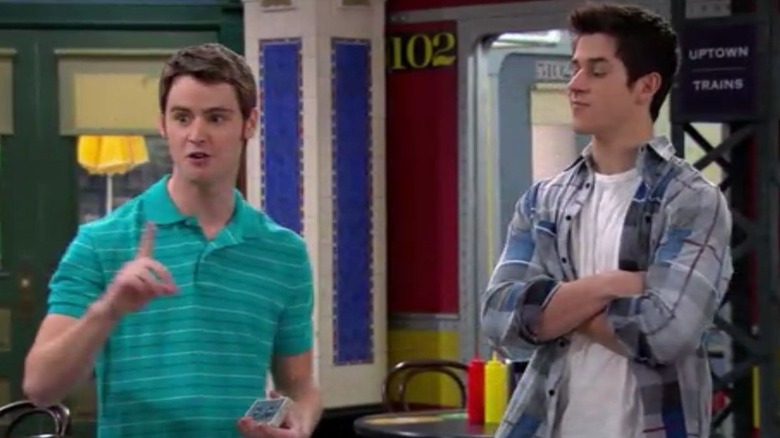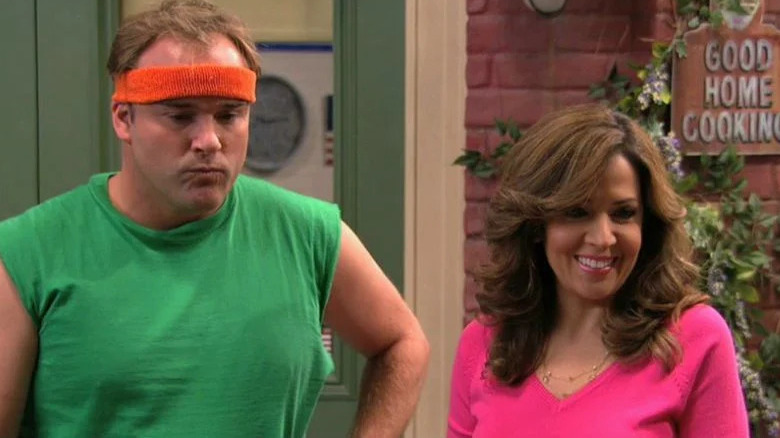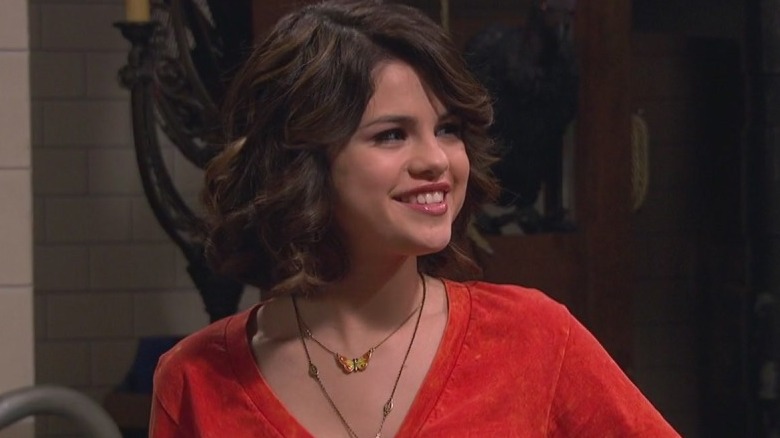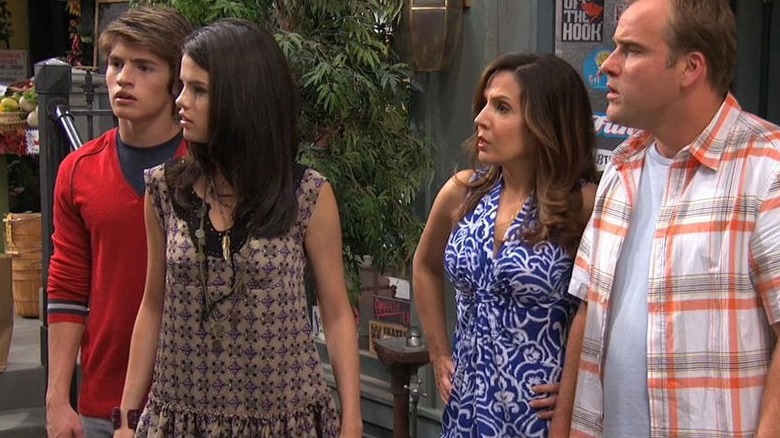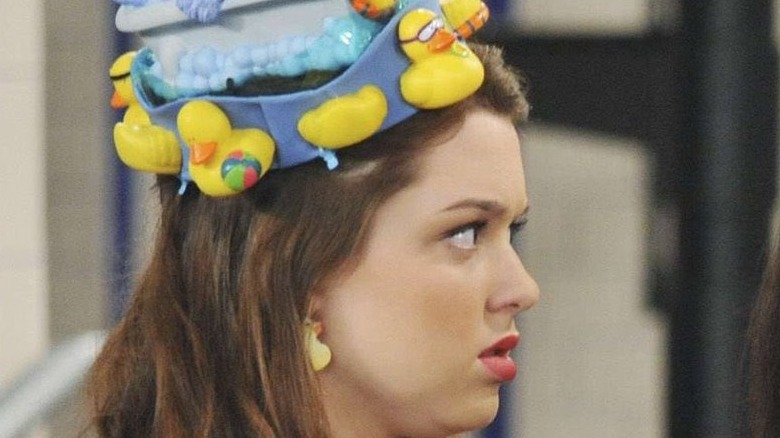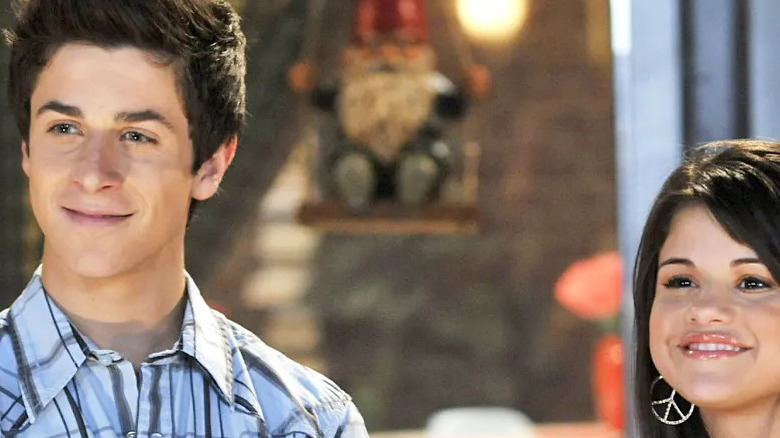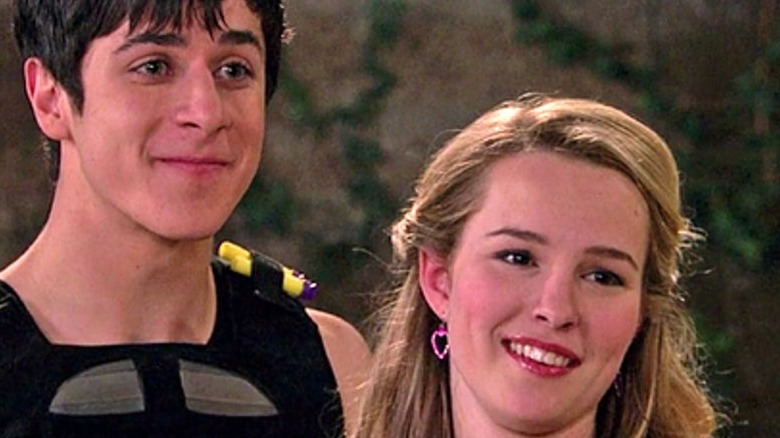Things Only Adults Notice In Wizards Of Waverly Place
If you were a kid in the early 2000s, chances are you binge-watched "Wizards of Waverly Place": the popular Disney show created by Todd J. Greenwald ran for four seasons and 106 episodes from 2007 to 2012, and chronicles a family of eccentric wizards living in Greenwich Village, New York. Included in the show's cast were a young Selena Gomez, David Henrie, Jake T. Austin, Maria Canals Barrera, David DeLuise, and Jennifer Stone.
Created around the same time as other childhood favorites like "Lizzie McGuire," "The Suite Life of Zack & Cody," "Hannah Montana," and "Sonny With a Chance," this show is definitely aimed at kids, but that certainly doesn't mean that there aren't a number of moments that will go over the heads of children and resonate with the adults in the audience. Whether it be a crude joke that's too adult for young viewers, explorations of deeper and more mature themes, or hilarious plot holes that just make no sense, the show is an absolute riot to look back on through more adult eyes.
Mason's age
"Wizards of Waverly Place" deals with a wide variety of mythical creatures, so naturally some of the show's characters age at different paces. For example, for the most part, vampires don't age, while wizards might age at the same pace as humans.
This is a little hard to keep track of, and can make for some head-scratching moments in the show. One of the most questionable examples is the relationship between werewolf Mason Greyback and vampire Juliet van Heusen, whose covert love affair is the subject of a lot of controversy because their families are sworn mortal enemies.
But what might stand out more to the adults watching the show is the fact that the couples' ages probably shouldn't match up quite so well. At one point, the two recognize one another after 300 years of being apart, and while it makes sense that the vampire Juliet looks the same after such a long time, the show never gives the viewer reason to believe that werewolves don't age. All told, it feels a bit like a convenient device for the love story that creators hoped that viewers would simply overlook.
The undo dust
Given that this is a show about wizards, it makes sense that there are quite a few magic spells involved. Hands down one of the most powerful and handy is the "undo dust," a potion that allows a wizard to give or take away power from another wizard. Most significantly, though, the dust has the ability to "undo" a spell, if need be.
This elixir is used in Season 2, Episode 15 of the show, titled "Art Teacher." At the beginning of the episode, Alex, Justin, and Max's dad introduces them to it, and it works like a charm. It's a fun little spell, and it's entertaining to watch. But the presence of it begs the question: why don't the wizards use the potion regularly to get themselves out of the trouble that they constantly face throughout the course of the show? And why are they just learning about it now?
Horror movie tropes
If you've seen a horror movie or two in your life, chances are you're familiar with cheesy, overused horror movie tropes. These can include characters splitting up to find help (even though everyone knows you're much more vulnerable outside a group), running toward the killer, or the classic "go on without me" speech.
The creators of "Wizards of Waverly Place" play with these tropes in Season 1, Episode 9, "Movies." In this episode, Alex uses magic to sneak into a horror movie. Her plan works — with a twist. She finds herself inside the actual movie, where she gets a front row seat to all of these tropes. Lo and behold, a girl runs toward the killer screaming, and Justin gives the classic, dramatic martyr's speech — even though he's not actually hurt.
It's safe to assume that the kids watching "Wizards" wouldn't really recognize these tropes just yet, because they're too young to be super familiar with scary movies. But adults in the audience will inevitably recognize "Movies" as a hilariously clever satire of the genre.
The art teacher
When watching "Wizards of Waverly Place" as a kid, chances are you saw Alex's art teacher, Ms. Majorholey, as just another regular character. But when watching the show as an adult things become a little more ... complicated.
In Season 2, Episode 15, "Art Teacher," Alex discovers that Majorholey is actually a teenager who was turned into a middle-aged woman by her ex-boyfriend, TJ. Being the kind wizard that she is, Alex turns her teacher back into a teenager. For a kid watching, this may seem like nothing more than a kind gesture. But an adult will undoubtedly question the logistics of a teenager being transformed into an adult. Did no one care that teenage Majorholey went missing at Alex's high school? Did people eventually just give up looking for her? Did Majorholey give up on being turned back into a teen herself? Yes, maybe adults can be a little oblivious — but surely parents would have raised a few concerns.
The pocket elf
Just because "Wizards of Waverly Place" is technically a kids' show doesn't mean that it doesn't have some seriously dirty jokes every now and then. In Season 1, Episode 3, "I Almost Drowned In a Chocolate Fountain," Alex brings a Spanish-speaking pocket elf to her Spanish class to help her cheat on her test. When Justin catches her, she's forced to make something up on the fly so he doesn't catch on to her mischievous plot, and tells him that the container the elf hides in is actually her retainer case. Justin protests, saying that she doesn't wear a retainer, to which Alex quickly responds, "you don't know what goes in my mouth."
And as if Alex making such a lewd joke to her own brother wasn't bad enough, the elf then chimes in, saying: "And what a beautiful mouth it is!" Most kids are far too young to understand the innuendo of these jokes, so the humor was clearly put there for the adults to have a little chuckle.
Vitamins
It's hard to be a responsible adult in this day and age without taking care to be privy to pretty much every single scam email that exists — from someone claiming to be royalty and offering to give you millions of dollars in exchange for helping them transfer their money, to being contacted by companies selling various supplements and alleged miracle drugs.
In Season 3, Episode 22, "Captain Bob Sherwood," Justin appears to fall victim to the latter. He explains that he never opens emails because they are always scams trying to sell him pills. This is most likely a nod to the popular male-enhancement pill scam, but what makes this reference even funnier is that soon after, Harper arrives with pills that Justin apparently won, suggesting that he did indeed fall for the scam. Although kids are thankfully shielded (for the most part) from the sinister world of online con artists, adults watching this episode will definitely have been offered one or two of these promotions in their day.
Smarty pants
This is another prime example of a mildly dirty joke that more than likely went right over the heads of the kids in the audience. One of the magic tools in "Wizards of Waverly Place" is a pair of pants called the "Smarty Pants" that give whoever wears them a superhuman level of intelligence.
At one point, a character advises Zeke, one of Justin's best friends, to be careful with the pants because they're dangerous, referring to the amount of psychological power they wield. Zeke responds by asking how they can be dangerous — they don't even have a zipper. This joke alludes to the fact that sometimes guys can get in trouble if they zip their pants up too quickly (think Ben Stiller in "There's Something About Mary"). Chances are, while kids won't quite understand that kind of innuendo just yet, adults will be forced to think about the ways pants with zippers can go terribly wrong.
Alex's Identity
When it was released in 2007, "Wizards of Waverly Place" was viewed as progressive for its time, because it depicts a mixed-race family, with Alex's mother being Mexican and her father being Italian. The characters in the show draw attention to this fact every so often, and one example in particular stands out. At one point, Alex says, "I love being half Mexican and half-whatever he is," referring to her father. While at first glance this might seem like nothing more than a funny and light-hearted joke, looking back on it now Alex's flippancy when it comes to the subject suggests that she isn't totally sure where exactly she's from. And while this might not be a topic that kids give a whole lot of thought just yet, it's certainly something that adults might look at and worry that Alex is having something of a mini identity crisis.
Alex is a total slacker
When one thinks of a wizard, an individual with skill, integrity, and morals often comes to mind — not someone who is a total slacker and will do just about anything to get out of working hard, no matter how crazy it may be. But Alex of "Wizards of Waverly Place" is both a wizard and one of the laziest people on the planet. She often uses her wizardry to cheat and get out of things she doesn't want to do.
Sometimes, she takes this to serious extremes, like when she has to step up and play Tinker Bell in her school play in Season 2, Episode 12, "Fairy Tale," after Harper gets injured and cannot perform the role herself. To get out of this, Alex plans to leap off of the stage and hurt herself, too. Her plan isn't successful, but still — the commitment to not doing something is pretty real here. This hilarious personification of teen angst will absolutely resonate with the adult audience, many of whom have raised such teens, or perhaps were exactly like Alex once upon a time.
Greenwich Village
The title of "Wizards of Waverly Place" refers to a very real street in New York City: Waverly Place in Greenwich Village. Of course, it's already pretty funny that this is a show about wizards surrounded by humans that is set in a very real neighborhood in New York. What's even more interesting, though, is that Greenwich Village is super saturated with a very rich, important, and rebellious history.
Known as the bohemian capital of New York, Greenwich Village was the birthplace of the 1950s Beat movement, which consisted of poets, artists, and writers such as Allen Ginsberg and Jack Kerouac, who used their art to consider the post-war world they were living in. The neighborhood was also ground zero for '60s counterculture movement on the East Coast, which saw people protesting the Vietnam War. The area is responsible for a lot of against-the-grain poetry and anti-establishment sentiment. This is a history that, for the most part, only adults are super cognizant of. Not only is Greenwich Village a unique setting choice, but this background makes Alex's rebellious personality even funnier. One can't help but think that the creators picked this segment of the city on purpose for that exact reason.
Harper's outfits
Without a doubt the most eccentric character in all of "Wizards of Waverly Place" is Harper, Alex's best friend. Harper's defining characteristic is her wacky outfit choices. And while they're undoubtedly fun to look at, when watching the show as an adult, it's hard to ignore just how impractical some of them are. At one point, Harper shows up wearing a dress with a bunch of rubber ducks hanging off it. And while it's hard not to appreciate the boldness, one can't help but wonder: What if she brushes up against something? Isn't she worried the dress will squeak?
Another time, she has a dress with rows of markers hanging off the front. Points for creativity, but wouldn't it be super annoying to have them rattling around all day? And what if a cap falls off and ink spills everywhere? Let's face it: there are a lot of things that can go wrong where these outfits are concerned.
The wizard competition
One of the biggest events in "Wizards of Waverly Place" is the wizard competition. Every wizard family has one, and it involves wizard siblings battling each other in order to decide which one will become the "Family Wizard" — the only one allowed to keep their powers. This tradition is set up by the "Wizard Council," which, by the sounds of it, has been around for a very long time.
The reasons behind the wizard competition are never really explained in the show. Some fans have wondered whether it's some form of wizard population control, or incentive for young wizards to study even harder. Something people don't talk about often, though, is why Alex, Justin, and Max's parents, Jerry and Theresa, would have more than one kid in the first place if they knew that those kids would eventually have to battle one another for the title of family wizard. Why would you want to see your children suffer by having their powers taken away? And does any parent actually want to watch their kids fight one another?
It's established throughout the show that Jerry and Theresa are compassionate people, given their willingness to talk to their kids about their relationships, and the care they put into teaching them about the minutiae of wizardry. And so it seems like they'd want to avoid seeing anyone close to them in pain — let alone their own offspring. There's also the sense that this competition is a long-standing tradition, so it's not like the couple didn't know about it before they had three kids of their own. Adults in the audience — especially parents — are likely to scratch their heads at this one.
Juliet's mortality
"Wizards of Waverly Place" deals with a lot of different characters at a lot of different ages. From vampires who don't age at all to werewolves who age at a confusing (and never totally clarified) speed and wizards who age at the same speed as humans, it can all get a little difficult to keep track of at times. Things get particularly dicey, however, when it comes to the vampire Juliet's age. It was already a little confusing that her character recognized Mason after 300 years, despite them probably aging at very different speeds, but in Season 3, Episode 9, "Wizards vs. Werewolves," her immortality is taken away and it's revealed that she's actually 2,193 years old. She then walks away with the werewolf Mason, leaving Justin heartbroken because he's in love with Juliet, and Alex heartbroken because she's in love with Mason.
While Justin and Alex's sadness is front and center in this moment, and therefore young viewers might not have much else on their minds, adults will likely realize that there's a gaping plot hole in this scene. If Juliet is no longer immortal, then how is she still alive? The world's oldest recorded person, Jeanne Calment, was only 122 years old when she died, which would make Juliet 2071 years older than the oldest person who ever lived.
